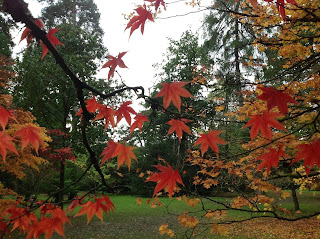Kicking out the enchanting summer, came in the Colours, for now I was thinking yet another wonderful summer came to an end...
and the depressing winter, more dark and less light days takes in the pride dominating all the sunshine :(
But then the Autumn is a complete mood lifter - which gives me the sense of some happiness to enjoy the fall - the colours, where in all the trees like maples and oaks undergo a seasonal change...they are bright and ripened and before they wither away...!
Yes, indeed, its such a delight to see the golden, pink, orange red... the subtle colours of maples and oaks...blushing and smiling and giving away the last love for the year...
Everyday I walk down the streets from home to office, I admire in awe, the beauty of these trees and their adaptability to save energy during winters when there is less sunlight... for me who loves both science and colours,
this definitely made me happy and smile with glee... And then decided to vist, "Westonbirt Arboretum" before the winds roar high until the leaves fall off and the tree stands bare in the dark...
"Westonbirt Arboretum" - ranks number 1 place in Britain to visit the Autumn colours... This National Arboretum is managed by the Forestry Commission and reading the reviews about this place on net and also seeing the pictures on Facebook, I could not really wait long to go there...
It showed about 2:30 hrs of journey from where we live, its situated in Gloucester near Bath Road... but no matter the distance, I wanted to witness the heap of colours...and the very thought of it made my heart to rejoice!
So we started on a weekend morning by 10ish, reached there by 2 in the afternoon... within sometime managed to get into the arboretum , following the map we could see hoards of colourful tree... Started gazing deeply, could see the divinity in the trees...I was seizing every moment to capture the colours, really could not stop myself from engrossing in this fantastic beauty..! Words never make justice... I say, one has to really feel it by seeing it!
One particular path called, "Circular Colours" or something was spectacular...There were so many trees all of them unique and beautiful - Acer Glade, Japanese Maples, Birches, Oaks etc...
It was just colours and colours everywhere... As if God painted them Gold, Red, Pink, Gold... :)
If colours were one side, the other side was boulevard of tall huge trees... a really mind-blowing view... all I did was to stand there and let my eyes n heart have the fun!
There were loads of fallen leaves, loved (as always) the soft walk on these fallen Autumn leaves making rustling and crunching noise and loved the way it felt like - a bit of cushion :)
In the midway we stopped, rested on a bench-chair had our home made wraps and the amazing home made Indian chai!!! definitely added and elated our trip of Colours, a complete treat to eyes!
Managed to cover about 60% of the reserve by the end of the day, as its very huge could not really capture it completely, but this is one of the best places I have visited so far, If you like colours, the smell of woods, the sound of crunching leaves - then this is the place!
Autumn is BitterSweet indeed! :)











